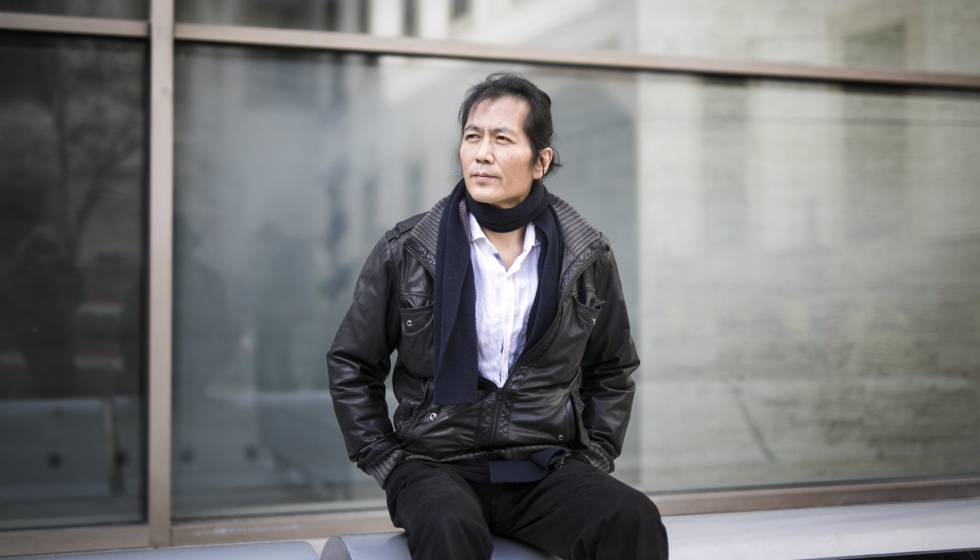“In Orwell’s ‘1984’ society knew it was being dominated. Not today”
Speaking in Barcelona, South Korean philosopher Byung-Chul Han argues social values have been eroded by consumerist culture
Barcelona

Philosopher Byung-Chul Hal is one of the most recognized critics of the problems caused by the hyper-consumerist and neoliberal society after the fall of the Berlin Wall. In books such as Fatigue Society, Psychopolitics and The Expulsion of Difference (published in Spain by Herder), the South Korean-born German author takes aim at this society and its effects on the individual.
“In Orwell’s 1984 society knew it was being dominated. Today we are not even aware of the domination,” he said on Tuesday at the Center of Contemporary Culture in Barcelona (CCCB). There, speaking about the eradication of difference, the Berlin University of the Arts professor gave his vision of the world today, a world where people exploit themselves, fear otherness and live in “the desert, hell or sameness.”
Time worked is time lost, it is not time for ourselves
Authenticity. According to Han, people sell themselves as authentic “because everyone wants to be different from the rest.” This forces a person to “produce themselves” and this is impossible to do authentically because from “the desire to be different creates sameness.” As a result, the system only allows “marketable differences,” he says.
Self-exploitation. In Han’s opinion, society’s attitude has moved from “we have to do it” to “we can do it.” “We live with the anguish of not always doing what we are able to do.” “Today a person exploits themselves believing they are fulfilling themselves. It is the wicked logic of neoliberalism that culminates in the syndrome of the burned-out worker.” This has a very damaging effect. “There is no one the revolution can attack, repression does not come from other people.” It is the “alienation of one’s self” that can manifest as anorexia, overeating or the over-consumption of consumer or leisure products.
Big data. “Macrodata has made thought superfluous because if everything is countable everything is the same … We are in the middle of dataism: man is no longer in charge of himself but is instead the result of an algorithmic operation that controls him without him realizing it. We see it in China with the concession of visas according to state data, or in face-recognition technology.” Will refusing to share data or be on social networks turn into an act of revolt? “We have to adjust the system: the ebook is made to be read, not so I can be read through algorithms… Or does the algorithm now make the man? In the United States, we have seen the influence of Facebook in the elections… We need a digital agreement that restores human dignity and to consider a basic income for professions that will be devoured by new technologies.”
The desire to be different creates sameness
Communication. “Without the presence of another, communication will degenerate into an information exchange: relationships will be replaced by connections, and only connect with the same. Digital communication is just sight, we have lost all our sense, we are at a stage where communication has been weakened like never before: global communication and “likes” are restricted to what is most similar. Sameness doesn’t hurt!”
Garden. “I am different, I am surrounded by analogue objects. I have two 400kg pianos and for three years I have grown a secret garden that connects me to reality: colors, scents, feelings… I have allowed myself to notice the earth’s otherness: earth had weight, everything was done by hand, what’s digital has no weight, no resistance, you can move a finger and there it is … It is the abolition of reality. My next book will be called Eulogy to earth. The secret garden. Earth is more than digits and numbers."
Narcissism. Han believes that “being observed is a central part of our being today.” But the problem is that the “narcissist is blind when it comes to seeing the other.” and without this other “one cannot create a sense of self-esteem by themselves.” Art has also been affected by this trend: “It has degenerated into narcissism, it is at the service of the consumer, stupid and unjustifiable quantities of money are spent on it, it is already a victim of the system.”
Earth is more than digits and numbers
Others. This is central to Han’s most recent reflections. “The greater the similarity between people, the greater the production, this is the current logic. Capitalism needs all of us to be the same, including tourists. Neoliberalism would not work if people were different.” To recover our differences, Han suggests “returning to the inner animal, which doesn’t consume or communicate unfortunately. I don’t have concrete solutions. In the end the system might implode by itself… In whatever case, we are living in a radically conformist time… the world is at the limit of its capacities, perhaps it will short circuit and we will recover this inner animal.”
Refugees. On this subject Han is very clear: with the current neoliberal system “refugees do not inspire fear, terror or disgust but are rather seen as a burden, with resentment or envy.”
Time. The way time is used needs to be revolutionized, says Han. “Time worked is time lost, it is not time for ourselves.”
English version by Melissa Kitson.



Geen opmerkingen:
Een reactie posten